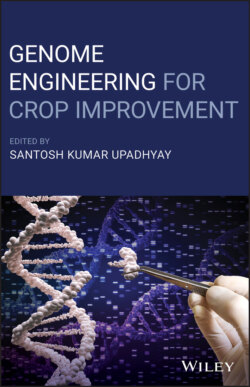Читать книгу Genome Engineering for Crop Improvement - Группа авторов - Страница 49
3.4.1.2 Wheat
ОглавлениеWheat (Triticum aestivum L.) also being a major staple food around the globe, having hexaploid genome (2n = 6x = 42, AABBDD), which is more than five times greater than the human genome (Borisjuk et al. 2019). Wheat production covers more than 240 million hectares (ha) globally and its gross world trade is greater than all other crops combined. Approximately, 21% of the world's food depends on annual wheat crop harvests, which often have relatively low stocks (FAO (Food and Agriculture Organization of The United Nations) Statistics 2014–15). However, there is a gap between current productivity gains as compared to those required to satisfy expected global demands over the coming decades. To reduce this gap, there is a dire need to explore new ways to improve wheat productivity. Genetic improvement has been a major contributor to enhance productivity in all crops important from the food security standpoint. Most of the wheat produced globally is consumed directly by humans as food. The requirement that wheat grain must be suitable to produce breads and other end products with complex and specific properties limit the rate of genetic gains in wheat production as the low grain quality varieties with high yield production are least preferred by consumers due to rises in their living standard. A clear understanding of genetic, molecular and biochemical bases of wheat grain quality might allow these requirements to be more easily satisfied and help to accelerate wheat productivity along with quality. Advances in next generation sequencing have been applied in many different ways that are relevant to wheat quality. The analysis of specific groups of genes allows identified genes influencing grain quality to be studied, while new genetic and molecular influences on wheat quality can be revealed by considering variations in the whole genome and relating all the differences to explain the basis in fluctuations in wheat grain quality.
